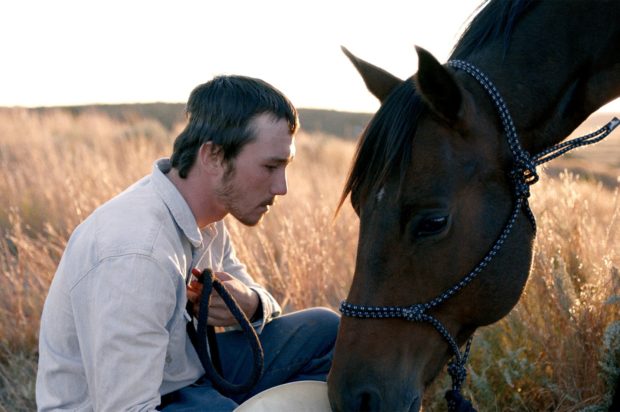 This film features real people playing themselves in a drama about a young rodeo hotshot whose career has been cut short by a head injury, and who must cope with whether he can ever again the one thing he loves the most: ride horses.
This film features real people playing themselves in a drama about a young rodeo hotshot whose career has been cut short by a head injury, and who must cope with whether he can ever again the one thing he loves the most: ride horses.
Sometimes I come across a real treasure by sheer chance. Recently, when the movie I’d gone to see was sold out, I went to another one in the same theater, and discovered a film of tremendous beauty and emotional power. It’s called The Rider, directed by Chloé Zhao, a drama based on the true story of a young rodeo hotshot, a Lakota from the Pine Ridge Reservation in South Dakota, prevented from doing what he loves after falling off a bucking bronco at a rodeo and suffering a severe head injury. The character’s name is Brady Blackburn; he’s played by Brady Jandreau, and although Zhao has mixed dramatic invention with true events, Jandreau and all the other people in the film are basically playing themselves, and the outline of the tale is true.
The film establishes a realistic atmosphere of life on the reservation, where everyone has to work hard to scrape by, and the relationships are presented with a relaxed naturalism that gently soaks into you. Brady’s relationship withh is autistic sister Lilly is tender and funny. His interactions with his father are often tense—Dad warned Brady not to get on that horse, and he never stops reminding him of that. Now he thinks his son needs to give up horse riding altogether if he doesn’t want to reinjure himself, fatally this time. And the local doctor agrees. Brady gets a job at the supermarket, but his heart can not let go of riding.
The young man knows how to tame horses too, and in this respect it was perfect that Brady play himself in the movie. We are shown the actual process in which he patiently and gradually calms a horse down, a horse that no one has been able to ride before, to the point where the animal accepts him and lets him mount and ride. You can’t fake the rapport he shows with horses in this film. Although his culture requires a certain masculine toughness and reserve, and Brady conforms to that most of the time, he has quite a few moments, especially with the horses, where we can see how sensitive he is. Jandreau, it turns out, is a fine actor, carrying the film with dignity.
His friends are all riders too. They fool around and make campfires and smoke weed. They assume that Brady will make a comeback. He believes it too, but struggles with doubt as well. His most touching friendship is with Lane Scott, a champion bull rider who also suffered a nasty fall and ended up a paraplegic. Brady visits him in the rehab center, helping him with physical therapy; even having him pretend to ride on a saddle that he brings into the hospital. Like everyone in the film, Lane Scott plays himself, and he’s remarkable. There’s not a trace of self-pity or defeat in his performance.
The Rider is imbued with the gorgeous expanse of land in South Dakota, especially at sunset and early evening. The bond between horse and man is palpable. More than that, the film examines what it’s like to lose that which seems to give us the only meaning we have. How can we grieve? What will it take to make us let go of the dream, and is it worth it? The Rider, like the great film that it is, doesn’t so much answer these questions as pose them in a way that penetrates to our souls.

A homicide detective becomes romantically obsessed with a woman suspected of killing her husband, in this stylish mystery from Park Chan-wook. The cinematic world...

A screenwriter couple’s stay on Ingmar Bergman’s home island of Fårö inspires an honest look at how women are represented in movies, in the...

A satire about a Black literary novelist who publishes a trashy book under a pseudonym to mock the way African Americans are depicted, only...